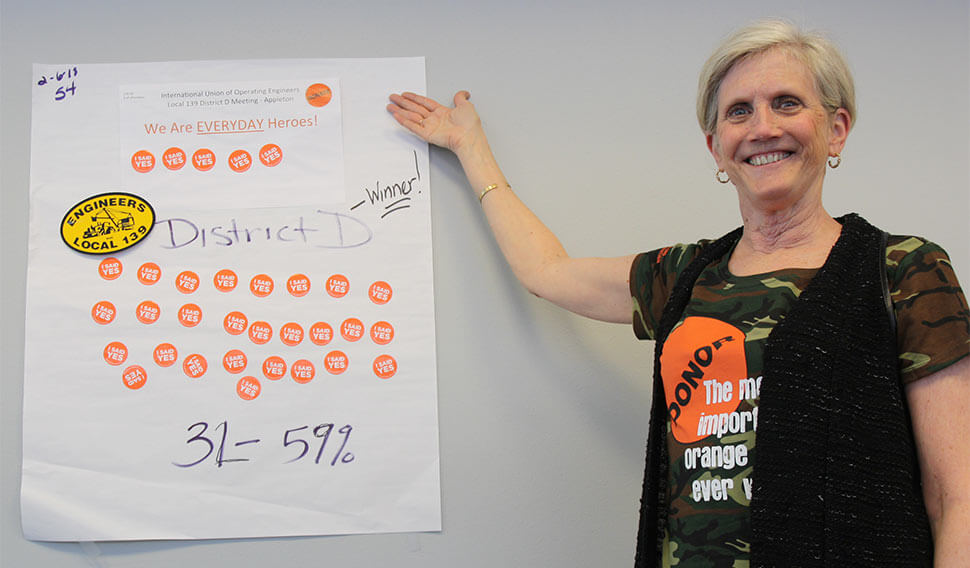
UW Organ Donation Campaign Needs IUOE Members
Sign Up and Donate to Life
UW Organ and Tissue Donation is looking for more than just a few good men. Actually, the Madison-based, organ-procurement group wants to contact about 253,000 men who are residents of its service area – a region that includes most of Wisconsin along with Michigan’s Upper Peninsula.
Those 253,000 represent the 43 percent of the male population in the region, ages 35-59, who have not registered to be an organ donor. Coincidently, males in that age group comprise slightly more than half of Local 139’s membership. And that’s a prime reason why Mary Nachreiner, a community development specialist for the group, spoke to the topic of organ donation at all four Local 139 district meetings in February. So when it comes to organ donation, many Operating Engineers in Wisconsin are in a key demographic, positioned to save the lives of others should the unfortunate occasion arise.
Nachreiner concentrates on male-dominated groups because research indicates that men are less likely to register for organ donation than women. Compared to the 43 percent of males who haven’t registered to donate in the UW Organ and Tissue Donation service area, 32 percent of women ages 35-59 have not.
Registering to become a donor can be done by:
- Saying “Yes” at the Department of Motor Vehicles and getting that orange dot on one’s driver’s license.
- Registering online at DonateLifeWisconsin.org – the same, secure, state-owned web site where your DMV decision is recorded.
“The need for transplanted organs is a medical crisis,” Nachreiner said in an interview following her stops at the Local 139 meetings. “It can be any of us on the waiting list for an organ; all ages, gender, kids, teens, adults, older adults.”
Nachreiner has more than a passing interest in asking people to register to donate their organs in the event of their untimely death. Her 16-year-old, middle daughter, Kelly, died on Jan. 4, 2000 from injuries sustained in a traffic accident six days earlier. Because Kelly Nachreiner had registered to be a donor when she received her driving learner’s permit four weeks prior to the accident, the lives of three strangers were saved by organs taken from Kelly. And on May 9, 2000, Gov. Tommy Thompson signed “The Kelly Nachreiner Law,” which mandates that drivers’ education classes devote 30 minutes to discuss organ and tissue donation.
Kelly’s Law was the first of its kind in the country. More than a dozen states have followed suit.
Another reason Mary Nachreiner took her message to Local 139 is because she has long-time personal ties to Len Shelton, the union’s recording and corresponding secretary and District B manager. Shelton’s son, Anthony, and Kelly Nachreiner were classmates and friends at Sauk Prairie High School in Prairie du Sac. Also, Shelton once worked with Mary Nachreiner’s husband, Leo.“It seemed like our union meetings would be a good setting where Mary could bring her message,” Shelton said. “This is a program that could benefit any one of us and our loved ones.”
Data from UW Organ and Tissue Donation shows that as many as eight lives can be saved from one organ donor. While kidneys make up 85 percent of organs donated, the heart, lungs, intestines, liver, and pancreas are needed in addition to eyes and skin.
The UW Organ and Tissue Donation service territory includes 58 of Wisconsin’s 72 counties and excludes southeastern Wisconsin.
In the spirit of friendly competition, Mary Nachreiner recorded how many Operators registered to become organ donors at each of the February district meetings, as a percent of total attendance at each meeting. District D finished on top with 32 Operators registering. That number represented 59 percent of 139ers attending the Feb. 6 Appleton District Meeting.
By DAVE BACKMANN
Local 139 Communications Director
 Legion Post 139
Legion Post 139
